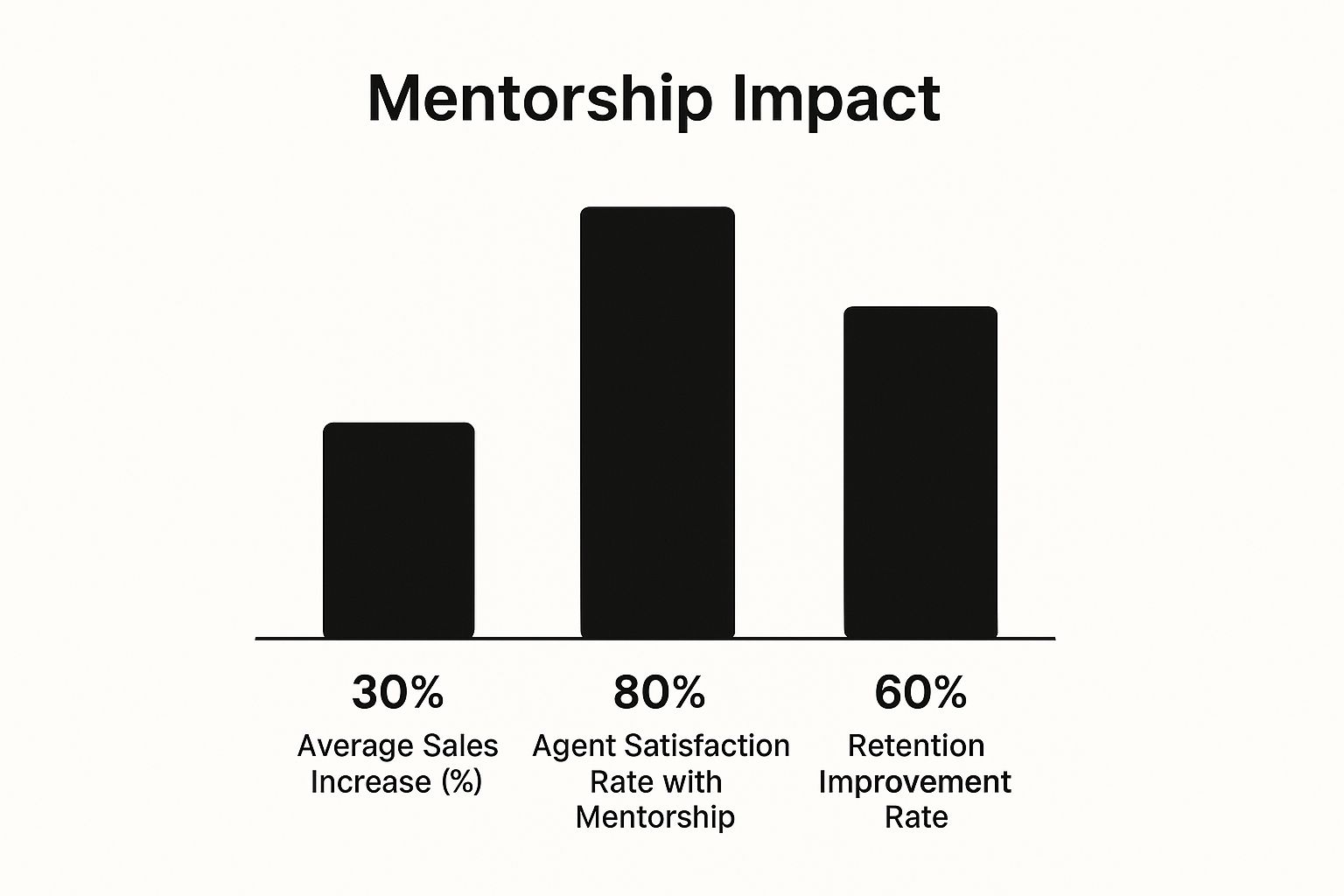Find the Best Real Estate Agent Mentor for Success
Why Most Agents Fail (And How Mentors Change That)
The real estate industry presents a unique set of challenges. It demands a diverse skillset, blending salesmanship, marketing know-how, financial understanding, and legal awareness. This complex combination contributes to a high attrition rate, with approximately 85% of real estate agents leaving the industry within their first five years. A significant factor in this high failure rate is the lack of adequate guidance and support. A real estate agent mentor can provide the essential coaching and support required to navigate this intricate field. Successful real estate professionals frequently credit their accomplishments to the mentorship they received early on. Learn more about the importance of real estate mentors.
The Power of Mentorship
Mentorship offers a vital structure for new agents facing industry challenges. Think of it as having an experienced guide leading you through the difficulties of your initial years in real estate. This support extends beyond fundamental training, providing personalized advice catered to individual strengths and weaknesses. Mentors recognize the emotional ups and downs inherent in this career path, offering both encouragement and practical strategies during challenging times.

The infographic above illustrates the positive influence of mentorship on key performance indicators such as sales growth, agent satisfaction, and retention. A mentor correlates with significant improvements across these areas, showcasing the tangible advantages of such guidance. Mentorship programs not only enhance sales but also cultivate greater agent satisfaction and significantly improve retention. These gains underscore how a supportive mentor can dramatically alter an agent's career trajectory.
Beyond Onboarding: True Mentorship
Many brokerages offer basic onboarding or training, but this frequently proves insufficient. Onboarding generally covers the technical aspects, like paperwork and regulatory compliance. True mentorship, however, helps develop crucial skills often neglected in standard training programs. This can include cultivating a sphere of influence, refining sales pitches, honing negotiation strategies, and understanding the subtleties of various market segments. This focused individual attention distinguishes true mentorship from basic onboarding.
Turning Points: From Potential Failure to Success
Numerous top-performing agents link their success to specific turning points involving a mentor. A mentor might, for instance, guide a struggling agent toward a niche market where they can excel, such as luxury properties or first-time homebuyers. Furthermore, mentors can provide invaluable feedback on client interactions, resulting in stronger relationships and increased deal closures. These seemingly minor adjustments, guided by an experienced mentor, can mark the difference between leaving the industry and flourishing within it. Securing the right real estate agent mentor can establish the necessary foundation for sustained success in this competitive field.
Finding Your Perfect Real Estate Agent Mentor Match
A successful mentorship depends heavily on finding the right fit. The wrong real estate agent mentor can be a significant waste of time, while the right one can truly accelerate your career trajectory. Choosing a mentor is a decision that requires careful thought and consideration. This involves evaluating potential mentors based on a few key factors.
Key Factors in Mentor Selection
-
Proven Track Record: Don't just look at years in the business. Instead, examine a potential mentor's specific accomplishments. How have they navigated challenges and adapted to changing market conditions? A consistent record of exceeding industry benchmarks and closing complex deals is a good sign.
-
Teaching Approach: Everyone has a different mentoring style. Some are very structured with detailed plans and frequent feedback. Others prefer a more hands-off approach, offering guidance and support when needed. Think about which style best suits your learning preferences. Do you thrive with structure, or do you prefer flexibility?
-
Specialty Expertise: The real estate field offers a wide range of specialties. These include everything from commercial properties to residential homes, luxury listings to investment opportunities. It’s important to find a mentor whose expertise aligns with your chosen career path. For instance, if you want to specialize in luxury real estate, a mentor focused on first-time homebuyers might not be the best fit.
-
Compatibility and Communication: A strong mentor-mentee relationship requires open communication and mutual respect. Consider how well you connect with a potential mentor personally. Do your communication styles work well together? Can you envision building a comfortable and productive working relationship?

Conducting Effective Mentor Interviews
Just as you would interview a potential employee, interviewing prospective mentors is essential. This process allows you to go deeper than initial impressions. Ask specific questions that uncover their mentoring philosophy and approach. How do they structure their mentoring sessions? What expectations do they have of a mentee? How do they define success in a mentoring relationship?
Paid vs. Organic Mentorships
Paid mentorship programs typically offer structured curriculums and often include group coaching. Organic mentorships, on the other hand, usually develop naturally through networking and shared connections. Each type has its own benefits and drawbacks. Paid programs frequently provide access to established resources and a network of peers, while organic relationships can offer more personalized attention and flexibility. Selecting the type of mentorship that best suits your personality and career goals is crucial.
Remember to ask about potential red flags, such as unrealistic guarantees or overly demanding time commitments. This due diligence can protect you from a potentially frustrating and unproductive experience.
Approaching Potential Mentors
Reaching out to a successful agent can feel intimidating. Frame the relationship as mutually beneficial from the outset. Offer to assist with tasks, contribute your skills, or share insights you’ve learned. This presents the mentorship as a collaborative partnership, rather than a one-sided request for help. By considering these key elements, you'll significantly increase your chances of finding a real estate agent mentor who can help you succeed in this dynamic field.
Market Mastery: What Your Mentor Should Truly Know
Successful real estate agents don't just close deals; they understand the market's intricate workings. This knowledge is especially vital considering the industry's vast scope. The global real estate market is valued at an astounding $637 trillion. Residential properties make up the lion's share at 81%, approximately $518 trillion. This highlights the importance of residential transactions, the core business for many agents and their mentors. For a deeper dive into these figures, check out these real estate agent statistics. This market expertise is the key differentiator between thriving agents and those merely surviving.
Identifying Emerging Opportunities
A seasoned mentor can help you spot emerging opportunities often missed by less experienced agents. They might, for instance, steer you toward a growing niche like eco-friendly homes or multi-generational housing. These emerging segments often have less competition and higher profit potential. Because these opportunities are rarely addressed in standard licensing courses, a mentor’s guidance becomes invaluable.
Market Analysis Techniques
A strong mentor should be proficient in teaching market analysis techniques. This involves understanding crucial factors like inventory levels, absorption rates, and price trends. These skills elevate an agent from a transaction facilitator to a trusted advisor. This positions you as a true real estate professional.
Navigating Hyperlocal Markets and Economic Trends
Real estate markets have distinct characteristics. A mentor can guide you through the nuances of your hyperlocal market. This might involve analyzing neighborhood-specific data, understanding local zoning regulations, or recognizing unique community dynamics. They’ll also teach you to analyze broader economic trends and their impact on your local area, enabling strategic decisions from pricing properties to anticipating market shifts.
Handling Market Volatility
Real estate markets fluctuate. Adapting to market volatility is crucial. A knowledgeable mentor can provide invaluable support during uncertain periods, offering strategies for navigating downturns and maximizing upswings. They can help you build a resilient business model that can weather market changes, ensuring long-term success. This resilience distinguishes those who flourish from those who simply endure. This crucial guidance is often missing from traditional real estate training, highlighting a mentor’s essential role.
Essential Skills Your Real Estate Agent Mentor Develops
Beyond simply understanding the housing market, a successful real estate agent possesses a unique skill set that sets them apart. By examining effective mentorship programs, we can uncover the core skills mentors cultivate in their mentees. This exploration delves into the practical exercises and real-world scenarios that accelerate the mastery of essential skills, from negotiation tactics to client relationship management.
Building a Foundation: Technical Expertise
Effective real estate agent mentors prioritize establishing a solid foundation in technical expertise. These skills are the fundamental building blocks for any successful agent.
-
Contract Nuances: A deep understanding of real estate contracts is crucial. Mentors guide mentees through common contract clauses, potential pitfalls, and strategies to protect their clients' best interests. This involves navigating contingencies, disclosures, and amendments.
-
Financing Structures: Understanding various financing options, including mortgages, loans, and other financial instruments, allows agents to effectively serve a wider range of clients. Mentors break down these complex topics and explain their impact on transactions.
-
Regulatory Compliance: Real estate is a heavily regulated industry. Mentors ensure their mentees understand federal, state, and local regulations. This knowledge protects both the agents and their clients from legal complications.
Mastering the Art of Communication: Soft Skills
While technical skills provide a necessary foundation, soft skills often determine an agent's overall success. These interpersonal abilities enable agents to build rapport, resolve conflicts, and effectively manage client expectations.
-
Emotional Intelligence: Mentors help mentees cultivate emotional intelligence, the ability to understand and manage both their own emotions and those of their clients. This fosters trust and strengthens client relationships.
-
Conflict Resolution: Disagreements and conflicts are common in real estate transactions. Mentors teach effective conflict resolution techniques, empowering mentees to navigate challenging situations professionally and constructively.
-
Time Management Systems: Real estate agents often juggle multiple tasks simultaneously. Mentors guide mentees in developing efficient time management systems to prioritize responsibilities, meet deadlines, and maintain a healthy work-life balance. This organizational skill is vital for long-term success.
To illustrate the progression of these skills under mentorship, let's look at the following table:
Essential Skills Development Timeline
Progression of key skills over time with effective mentorship
| Skill Category | Months 1-3 | Months 4-6 | Months 7-12 | Year 2 |
|---|---|---|---|---|
| Contract Nuances | Basic Contract Review | Identifying Common Pitfalls | Handling Complex Clauses | Expert Negotiation |
| Financing Structures | Mortgage Basics | Loan Types and Qualifications | Advanced Financing Options | Market Trend Analysis |
| Regulatory Compliance | State and Local Regulations | Federal Regulations | Ethical Considerations | Legal Updates |
| Emotional Intelligence | Self-Awareness | Client Communication | Building Rapport | Managing Expectations |
| Conflict Resolution | Identifying Conflict | Basic Mediation | Advanced Negotiation | Legal Solutions |
| Time Management Systems | Prioritization | Scheduling & Organization | Efficiency Techniques | Automation & Delegation |
This table highlights the structured development of skills over time, demonstrating the value of ongoing mentorship in building a successful real estate career. The initial months focus on foundational knowledge, while later stages emphasize practical application and advanced techniques.
From Novice to Expert: Accelerated Learning
High-performing agents often attribute their rapid growth to the guidance of their mentors. Structured mentorship programs can condense years of experience into months.
-
Advanced Negotiation Techniques: Experienced mentors teach advanced negotiation strategies that go beyond basic bargaining. This equips mentees to secure the best possible deals for their clients, maximizing their value.
-
Client Relationship Management (CRM): Building and maintaining strong client relationships is fundamental to a thriving real estate business. Mentors guide mentees in developing effective CRM systems, transforming clients into valuable referral sources.
-
Real-World Scenarios and Skill-Building Exercises: Mentors provide practical experience through role-playing, case studies, and real-world scenarios. These exercises accelerate skill development and boost confidence.
This comprehensive approach, balancing technical knowledge with essential soft skills, is how effective real estate agent mentors prepare their mentees for long-term success in a competitive industry. These skills, coupled with guidance from an experienced mentor, create a strong foundation for a fulfilling and prosperous career.
Leveraging Growth: Emerging Opportunities With Mentorship

The real estate industry is primed for significant growth. This presents a powerful opportunity for agents who are prepared to take advantage of it. Strategic positioning is key to maximizing returns in this dynamic market. A real estate agent mentor can provide the valuable guidance needed to navigate this exciting landscape.
The global real estate brokerage market is expected to reach $1,365.7 billion by 2033. This represents a 5.6% CAGR, according to statistics available here. Factors like increasing population, urbanization, and the growing wealth of younger demographics are driving this impressive growth. Mentorship can help agents harness these trends for their own success.
Identifying Emerging Markets
A forward-thinking mentor can empower agents to identify lucrative emerging markets. These mentors guide their mentees to analyze important factors. These include demographic shifts, technological advancements, and changing consumer preferences.
This careful analysis can reveal niche markets with high profit potential and less competition. For example, a mentor might suggest specializing in multi-generational housing. This is a growing trend driven by changing demographics.
Developing a Targeted Personal Brand
A strong personal brand is crucial for success in real estate. A real estate agent mentor can help mentees develop a brand that resonates with their target audience. This involves crafting a unique value proposition and defining your ideal client. It also includes creating a tailored marketing strategy.
Mentors often encourage skill development through established programs. Leadership development programs can be a valuable resource for agents looking to grow their businesses.
Case Studies: Pivoting to High-Growth Segments
Real-world examples provide practical insights and valuable learning opportunities. Many mentorship programs highlight the success stories of agents who have transitioned into high-growth areas. These case studies offer a concrete framework for evaluating new opportunities.
They also demonstrate the specific mentor-guided steps that fueled their success. This could include focusing on sustainable building practices or catering to the needs of remote workers. Learning from the experiences of others can turn abstract concepts into actionable strategies.
Mentor-Guided Steps for Transitioning
Shifting focus within the real estate market can be challenging. A real estate agent mentor offers practical guidance for transitioning into a chosen niche. This could involve acquiring new certifications, networking with relevant professionals, or developing specific marketing campaigns.
Mentors also provide ongoing support and feedback. This consistent guidance helps to ensure a smoother, more successful transition. By recognizing and responding to emerging opportunities, mentored agents gain a distinct competitive edge, setting themselves up for long-term success.
Building Your Ideal Mentorship Relationship Blueprint
A successful real estate mentorship depends on a well-defined structure. This framework transforms good intentions and aspirations into tangible results. Just as a contractor needs blueprints to build a house, you need a solid plan for a productive mentorship. This section provides proven systems, based on the experience of hundreds of successful real estate mentorships, to help you create a relationship that drives measurable growth.
Establishing a Productive Cadence
First, determine how often you'll meet with your real estate mentor. Some mentorships flourish with weekly check-ins, others prefer a bi-weekly or monthly schedule. The ideal frequency depends on your individual needs and learning style. It’s also important to establish clear communication channels. Will you primarily communicate through email, phone calls, or Zoom? A predetermined communication plan helps maintain consistent contact and avoids misunderstandings.
Accountability and Goal Setting
Accountability is the key to progress in any mentorship. Setting clear, measurable goals provides a roadmap for your development. These goals should be SMART: Specific, Measurable, Achievable, Relevant, and Time-bound. For example, instead of "increase sales," a SMART goal would be "increase sales by 15% within the next quarter." This specificity allows you to track progress and provides a benchmark for success. Regularly review these goals with your mentor, discussing your progress, challenges, and any necessary adjustments.
Exploring Different Mentorship Models
Various mentorship models exist, each with its own advantages. Intensive shadowing involves closely observing your mentor's daily activities, providing firsthand experience. Milestone-based programs focus on achieving specific objectives, offering a structured path for skill development. Understanding these different models and choosing one that aligns with your development needs is crucial. Consider your learning preferences, time constraints, and specific career goals when selecting a model.
Navigating Challenges and Maintaining Momentum
Even with the best laid plans, challenges can arise in any mentorship. Time constraints, mismatched expectations, and knowledge gaps can sometimes hinder progress. A clearly defined mentorship agreement outlining roles, responsibilities, and expectations can help prevent these issues. As your real estate business grows with the guidance of a mentor, you might consider supplementing your team. Carefully evaluate your needs and consider hiring freelancers. Utilizing progress tracking tools also helps maintain momentum and ensures both mentor and mentee are aligned. Open communication and a willingness to address challenges directly are essential for a strong, mutually beneficial partnership. Remember, a successful mentorship is a dynamic relationship requiring effort and commitment from both sides.
From Mentee to Mentor: Completing the Growth Cycle

The journey of a successful real estate agent often involves a significant transition: evolving from mentee to mentor. This shift signifies not only professional growth, but a deeper understanding of the industry and a desire to give back. We'll explore the timing and methods of this career evolution through conversations with agents who've made this transition.
Recognizing the Right Time to Mentor
Becoming a mentor isn't solely based on years of experience. It's a combination of factors. A solid track record, consistently surpassing sales goals and building a strong reputation, is crucial. Demonstrating expertise shows you can guide others effectively.
Equally important is the genuine desire to teach and share knowledge. Mentoring requires patience, empathy, and clear communication. These qualities help foster a positive and productive learning environment for your mentees.
The Unexpected Benefits of Mentoring
New mentors are often surprised by their own growth through the process. Explaining concepts to a mentee reinforces understanding and can reveal new perspectives. This teaching process solidifies your own mastery of the subject matter.
Mentoring also expands your network. Connecting with aspiring agents builds relationships that can lead to referrals, partnerships, and valuable industry insights. These connections enrich your professional life and create opportunities for collaboration.
Building Your Mentorship Approach
There's no single right way to mentor. Developing a unique style is key to attracting mentees and building strong relationships. Some mentors prefer a structured approach with regular meetings and defined goals.
Others favor a more flexible approach, offering support as needed. Consider your strengths. Do you excel at feedback? Or are you better at offering encouragement? Tailoring your approach to your strengths will make you a more effective mentor.
Creating Educational Content and Coaching Programs
One way to start mentoring is by creating educational content. This could be writing blog posts, developing online courses, or hosting workshops. Sharing insights helps aspiring agents and positions you as a thought leader.
For established mentors, developing coaching programs provides a more in-depth learning experience. These programs can focus on specific skill sets, such as negotiation or client management. This allows for a tailored and effective learning experience.
The Impact on Career and Personal Growth
Experienced mentors often discuss the impact of mentoring on their careers, both financially and personally. Mentoring enhances your reputation, attracting clients and potential partners. It can also lead to new opportunities, like speaking engagements.
Beyond professional benefits, mentoring offers a deep sense of fulfillment. Helping others succeed is rewarding and adds another dimension to your career. This sense of purpose can be as valuable as any financial gain.
Continuing Your Own Professional Evolution
Becoming a mentor doesn’t signify the end of your learning journey. The best mentors are lifelong learners, constantly seeking knowledge and staying ahead of industry trends. This benefits both you and your mentees.
By committing to continuous improvement, you enhance your skills and offer mentees the most current information. This ongoing evolution is essential for remaining a valuable resource and an inspiring figure in real estate.
Are you a California real estate agent seeking a supportive community and the resources to thrive? Explore the career opportunities available at Ashby and Graff and discover how their agent-centric approach, mentorship programs, and flexible commission plans can empower you to achieve your full potential.
Article created using Outrank






